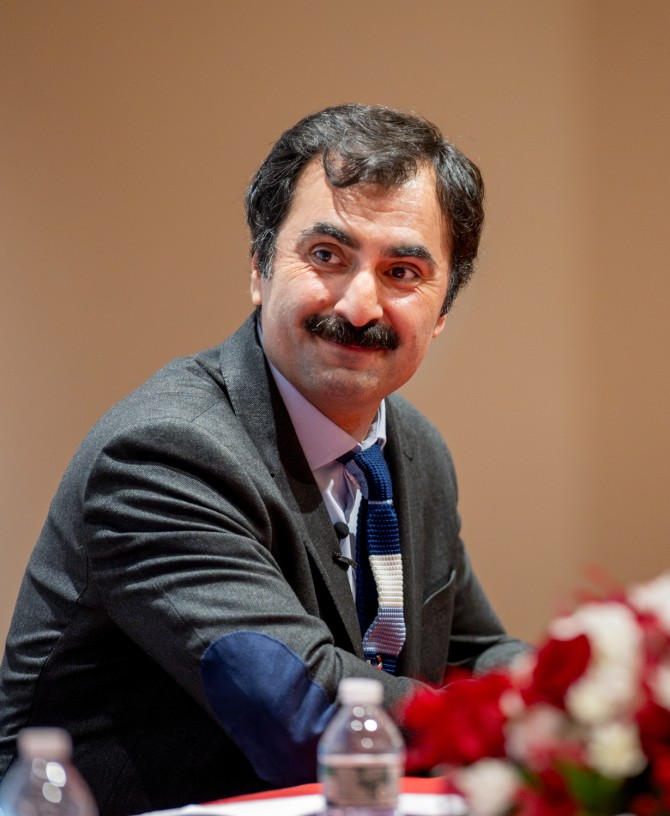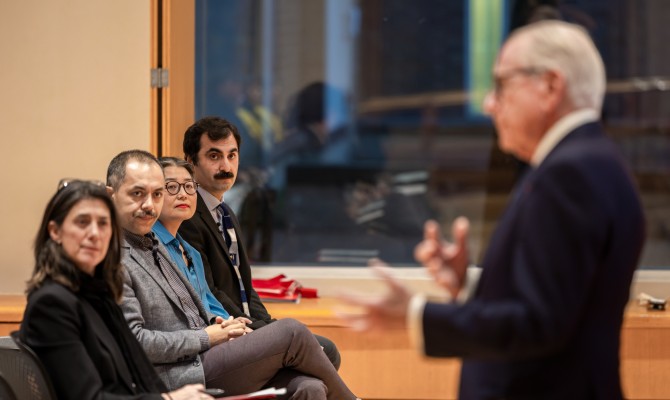News directly from Cornell's colleges and centers
Defying the Odds: Azat Gündoğan’s Journey to FSU
By Fatima Faizi
To mark this freedom of expression theme year, Global Cornell presents a three-part series profiling the challenges and successes of Cornell’s scholars under threat, written by Afghan journalist Fatima Faizi. When she fled Afghanistan in August 2021, Faizi was a correspondent for the New York Times and Al Jazeera. Today she is a student at Columbia University’s School of General Studies in New York City.
At Florida State University, sociologist Azat Gündoğan uses his experiences to teach students about the challenges of cities around the world and forms of social disparities that people face. His own journey as a refugee and scholar under threat from Turkey serves as an inspiring example of what determination and education can achieve.
Today Gündoğan, an associate teaching professor, plays a key role in developing new curriculum in FSU’s University Honors Program. He teaches with the passion of someone who has deeply valued and fiercely defended the core of higher education: academic liberty.
Rewind a few years to Cornell University, where Gündoğan found sanctuary after his family fled Turkey. He and his wife, historian Nilay Özok-Gündoğan, are Kurdish, and the government of President Recep Tayyip Erdoğan was intensifying its crackdown on critics and minority Kurds. They were forced to flee in January 2016 after Erdoğan accused them – and more than 2,000 fellow academics – of treason.
With support from Global Cornell and the International Institute of Education’s Scholar Rescue Fund (IIE-SRF), Gündoğan became a IIE-SRF fellow and visiting scholar at the Institute for European Studies, part of the Mario Einaudi Center for International Studies.
“The IIE-SRF fellowship was a lifeline,” Gündoğan said. “Cornell wasn’t just a stopover. It was a catapult that launched me toward future possibilities.”
Since 2016 Cornell has hosted more IIE fellows than any other university in the world. Gündoğan returned to campus on Oct. 30 to share his experiences on a freedom of expression panel with IIE’s CEO Allan Goodman. At the event Goodman awarded Cornell the IIE Centennial Medal for outstanding contributions to international education.
During his time at the Einaudi Center, Gündoğan found more than a secure space to continue his work on urban development in Turkey. He found a nurturing environment rich with diversity, an academic buffet of perspectives and a collegial community that bolstered his confidence and refined his ambitions.
“When scholars who are at risk end up in resource-filled universities like Cornell, they are actually in a very vulnerable situation. They leave their homes, families, their jobs behind,” he said. “So it’s important for them to not feel isolated, because some of those experiences are pretty traumatic. They need to be addressed in an open and honest environment. And I found this in Cornell.”
Gündoğan says his position at Einaudi made him part of a professional network that embraced his expertise: “I was invited to give talks about my research and about the things that were happening in Turkey. Such invitations eventually helped me regain my voice.”
Gündoğan and his wife – also FSU faculty – have found personal stability in Florida and a sense of home.
“It’s been six years since we moved to Tallahassee. It’s a good feeling to eventually form our own community of scholars and neighbors,” he said, “and my connections with Cornell are still strong.”
Gündoğan’s foundational experience at Cornell honed his vision for what he brings to the University Honors Program at FSU. His honors signature courses are a journey through human thought and urban landscapes, where students grapple with ideas of utopia, the realities of social inequality and the poetry of cinematic cities.
His methodology is as much about the heart as the mind, embodying the values of a well-rounded education that champions curiosity and engagement.
Recognition of Gündoğan’s dedication to his craft and students came last year, when FSU honored him with a universitywide inclusive teaching and mentorship award for his unique approach to education, one that marries rigor with compassion, excellence with accessibility.
Yet Gündoğan’s narrative transcends his teaching accolades. It’s about his quiet advocacy for those still on the perilous path he once walked. He is a staunch defender of academic freedom and an empathetic mentor to scholars facing persecution, often reminding them to “engage, connect, seek support and advocate” – the pillars that sustained him through his most challenging times.
As he publishes articles in top-tier journals and finalizes his book manuscript, a volume likely to stir the urban studies field, Gündoğan’s voice has never been more vital. It echoes in the corridors of FSU, in the halls of conferences where he presents his findings and in the quiet moments when a struggling scholar reads his words of encouragement and feels a little less alone.
Fatima Faizi is a freelance writer for Global Cornell. Watch for additional Defying the Odds stories in 2024.
Media Contact
Get Cornell news delivered right to your inbox.
Subscribe




